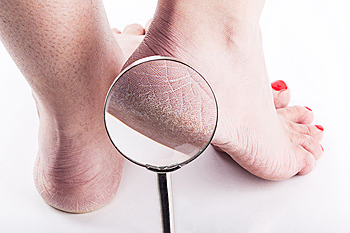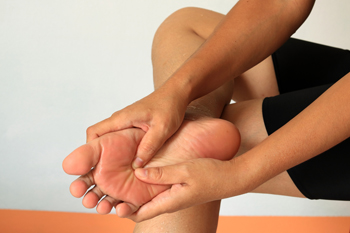Blog
Possible Causes of Cracked Heels
 Cracked heels can be an uncomfortable foot condition. This ailment is defined as deep cracks, or fissures in the skin of the heel of the foot, and in severe cases, may cause bleeding or an infection. They can gradually develop as a result of wearing shoes that have an open back, or from medical conditions that can include eczema or psoriasis. Patients who live in dry and cold climates may frequently experience cracked heels, and it is beneficial to begin proper treatment as soon as you notice any irregularities. Treatment can consist of washing and drying the feet thoroughly, followed by applying a good moisturizer. Additionally, it may be beneficial to stay as hydrated as possible by drinking adequate amounts of water on a daily basis. If you are experiencing cracked heels for any reason, it is strongly suggested that you speak with a podiatrist as quickly as possible who can help you go over proper treatment choices.
Cracked heels can be an uncomfortable foot condition. This ailment is defined as deep cracks, or fissures in the skin of the heel of the foot, and in severe cases, may cause bleeding or an infection. They can gradually develop as a result of wearing shoes that have an open back, or from medical conditions that can include eczema or psoriasis. Patients who live in dry and cold climates may frequently experience cracked heels, and it is beneficial to begin proper treatment as soon as you notice any irregularities. Treatment can consist of washing and drying the feet thoroughly, followed by applying a good moisturizer. Additionally, it may be beneficial to stay as hydrated as possible by drinking adequate amounts of water on a daily basis. If you are experiencing cracked heels for any reason, it is strongly suggested that you speak with a podiatrist as quickly as possible who can help you go over proper treatment choices.
Cracked heels are unsightly and can cause further damage to your shoes and feet. If you have any concerns, contact one of our podiatrists from Pennsylvania. Our doctors can provide the care you need to keep you pain-free and on your feet.
Cracked Heels
Cracked heels appear unappealing and can make it harder for you walk around in sandals. Aside from looking unpleasant, cracked heels can also tear stockings, socks, and wear out your shoes. There are several methods to help restore a cracked heel and prevent further damage.
How Do You Get Them?
Dry skin is the number one culprit in creating cracked heels. Many athletes, walkers, joggers, and even swimmers suffer from cracked heels. Age and skin oil production play a role to getting cracked heels as well.
Promote Healing
Over the counter medicines can help, especially for those that need instant relief or who suffer from chronic dry feet.
Wear Socks – Wearing socks with medicated creams helps lock in moisture.
Moisturizers – Applying both day and night will help alleviate dryness which causes cracking.
Pumice Stones – These exfoliate and remove dead skin, which allows for smoother moisturizer application and better absorption into the skin.
Change in Diet
Eating healthy with a well-balanced diet will give the skin a fresh and radiant look. Your body responds to the kinds of food you ingest. Omega-3 fatty acids and zinc supplements can also revitalize skin tissue.
Most importantly, seek professional help if unsure how to proceed in treating cracked heels. A podiatrist will help you with any questions or information needed.
If you have any questions, please feel free to contact one of our offices located in Plymouth Meeting and Ambler, PA . We offer the newest diagnostic and treatment technologies for all your foot care needs.
How Does Morton’s Neuroma Develop?
 Patients who are afflicted with Morton’s neuroma often feel pain and discomfort in the ball of the foot. This condition can occur as a result of thickened tissues between the toes, and the pain may be more severe while walking. Additional symptoms may include a numbing or tingling sensation, limited mobility, and it may be difficult to wear shoes that do not have adequate room for the toes to move freely in. It may develop from existing foot conditions, or from frequently participating in running or jumping activities. There are several methods of diagnosis, which can include having an X-ray, ultrasound, or MRI performed. If you have pain in this area of your foot, and think it may be Morton’s neuroma, it is strongly advised that you schedule a consultation with a podiatrist who can begin the correct treatment plan for you.
Patients who are afflicted with Morton’s neuroma often feel pain and discomfort in the ball of the foot. This condition can occur as a result of thickened tissues between the toes, and the pain may be more severe while walking. Additional symptoms may include a numbing or tingling sensation, limited mobility, and it may be difficult to wear shoes that do not have adequate room for the toes to move freely in. It may develop from existing foot conditions, or from frequently participating in running or jumping activities. There are several methods of diagnosis, which can include having an X-ray, ultrasound, or MRI performed. If you have pain in this area of your foot, and think it may be Morton’s neuroma, it is strongly advised that you schedule a consultation with a podiatrist who can begin the correct treatment plan for you.
Morton’s neuroma is a very uncomfortable condition to live with. If you think you have Morton’s neuroma, contact one of our podiatrists of Pennsylvania. Our doctors will attend to all of your foot care needs and answer any of your related questions.
Morton’s Neuroma
Morton's neuroma is a painful foot condition that commonly affects the areas between the second and third or third and fourth toe, although other areas of the foot are also susceptible. Morton’s neuroma is caused by an inflamed nerve in the foot that is being squeezed and aggravated by surrounding bones.
What Increases the Chances of Having Morton’s Neuroma?
- Ill-fitting high heels or shoes that add pressure to the toe or foot
- Jogging, running or any sport that involves constant impact to the foot
- Flat feet, bunions, and any other foot deformities
Morton’s neuroma is a very treatable condition. Orthotics and shoe inserts can often be used to alleviate the pain on the forefront of the feet. In more severe cases, corticosteroids can also be prescribed. In order to figure out the best treatment for your neuroma, it’s recommended to seek the care of a podiatrist who can diagnose your condition and provide different treatment options.
If you have any questions, please feel free to contact one of our offices located in Plymouth Meeting and Ambler, PA . We offer the newest diagnostic and treatment technologies for all your foot care needs.
Possible Causes Of An Ingrown Toenail
 There are many people that suffer from a condition which is known as an ingrown toenail. Research has shown it generally does not cause harm, unless it becomes infected. This ailment can happen as a result of trimming the toenails incorrectly, or it may gradually develop from wearing shoes that do not have ample room for the toes to move freely in. A noticeable symptom can include swelling as the nail grows into the outer edges of the skin. Additionally, there may be a discharge that oozes from the affected nail, and this may add to existing pain and discomfort. Many patients have found mild relief when the affected nail is soaked in warm water, and this may be beneficial in softening the surrounding skin. If you have an ingrown toenail, please consult with a podiatrist who can guide you toward treatment options that are correct for you.
There are many people that suffer from a condition which is known as an ingrown toenail. Research has shown it generally does not cause harm, unless it becomes infected. This ailment can happen as a result of trimming the toenails incorrectly, or it may gradually develop from wearing shoes that do not have ample room for the toes to move freely in. A noticeable symptom can include swelling as the nail grows into the outer edges of the skin. Additionally, there may be a discharge that oozes from the affected nail, and this may add to existing pain and discomfort. Many patients have found mild relief when the affected nail is soaked in warm water, and this may be beneficial in softening the surrounding skin. If you have an ingrown toenail, please consult with a podiatrist who can guide you toward treatment options that are correct for you.
Ingrown toenails can become painful if they are not treated properly. For more information about ingrown toenails, contact one of our podiatrists of Pennsylvania. Our doctors can provide the care you need to keep you pain-free and on your feet.
Ingrown Toenails
Ingrown toenails occur when a toenail grows sideways into the bed of the nail, causing pain, swelling, and possibly infection.
Causes
- Bacterial infections
- Improper nail cutting such as cutting it too short or not straight across
- Trauma to the toe, such as stubbing, which causes the nail to grow back irregularly
- Ill-fitting shoes that bunch the toes too close together
- Genetic predisposition
Prevention
Because ingrown toenails are not something found outside of shoe-wearing cultures, going barefoot as often as possible will decrease the likeliness of developing ingrown toenails. Wearing proper fitting shoes and using proper cutting techniques will also help decrease your risk of developing ingrown toenails.
Treatment
Ingrown toenails are a very treatable foot condition. In minor cases, soaking the affected area in salt or antibacterial soaps will not only help with the ingrown nail itself, but also help prevent any infections from occurring. In more severe cases, surgery is an option. In either case, speaking to your podiatrist about this condition will help you get a better understanding of specific treatment options that are right for you.
If you have any questions please feel free to contact one of our offices located in Plymouth Meeting and Ambler, PA . We offer the newest diagnostic and treatment technologies for all your foot and ankle needs.

